
Pictures of Caterpillars
by puzzlemaker
As you can see, I'm a bit of a caterpillar nerd. These are the best caterpillar photos I've ever taken. Some caterpillars I've identified, some I haven't.
My Favorite Pictures of Unique Caterpillars
From my own collection
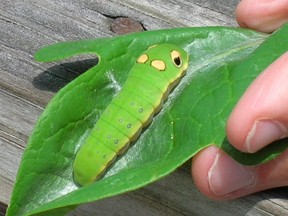 I've made a folder on my computer to hold all the caterpillar pictures I've taken over the years. If I held that virtual folder in my real hands it would be stuffed so full of prints that they'd be falling out on the floor. Just for fun I decided to pick out my favorite photos of caterpillars and share them on this page. I also love photographing the miraculous moths and butterflies these critters turn into, but moths and butterflies rarely sit still for photography! For me, these caterpillars are much easier to photograph.
I've made a folder on my computer to hold all the caterpillar pictures I've taken over the years. If I held that virtual folder in my real hands it would be stuffed so full of prints that they'd be falling out on the floor. Just for fun I decided to pick out my favorite photos of caterpillars and share them on this page. I also love photographing the miraculous moths and butterflies these critters turn into, but moths and butterflies rarely sit still for photography! For me, these caterpillars are much easier to photograph.
At the time of publishing this article I've add photos of seven amazing caterpillars. I hope to add more and more as I find and photograph them.
Where I found it: Jacksonville, Florida
What plant was it on? Sassafrass? Can't remember
Did I raise it to moth/butterfly? No
Scientific name: Papilio troilus
Spicebush Swallowtail caterpillars go through different stages (instars) and look completely different along the way. This stage is the last one before it makes a chrysalis. I took this photo while attending a butterfly class by butterfly expert Mark Minnow. To say I enjoyed the class would be putting it lightly. It was such fun to be around other people who also loved and studied butterflies. I was so impressed by this caterpillar I immediately purchased a host plant (a spicebush) for my own yard and yes! I eventually had a caterpillar just like this on my plant.
Help with Identifying Butterflies, Moths and their Caterpillars
Nothing compares to a field guide when ID'ing caterpillars
 |  |
| Caterpillars of Eastern North America... Princeton University Press Only $18.05 | Butterflies through Binoculars: The E... Oxford University Press, USA |
Where I found it: Jacksonville, Florida while on a nature walk
What plant was it on? Wild cherry tree
Did I raise it to moth/butterfly? Yes
Scientific name: Furcula borealis
I found these 2 caterpillars by accident. I drove all the way home with them not knowing they were on the same branch with a tent caterpillar i was after. Even with the internet it was hard to identify these little guys. I searched terms such as forked tail, spiked tail, tail in two parts, green, yellow, saddle etc. and finally identified it. I also sent my findings and photos to What's that Bug to confirm the ID. And they published my photos and comments! It made me feel great to see my very own photos on the web. By the way, What's that Bug is the best insect ID website in the world. If you go there, I'm just warning you that you'll be there for hours.
See the cocoon and moth this caterpillar turned into:
 White Furcula Moth emerged from Cocoon Copyright © Paige Graves |
Where I found it: Washington Oaks State Park, Palm Coast, Florida
What plant was it on? it was crawling along a path
Did I raise it to moth/butterfly? No
Scientific name: Seirarctia echo
My daughter actually found this one just before she stepped on it. How handsome! It is large and has orange spikes (also described as fuzzy orange) with a black body and yellow ribs, rings or some call them stripes. It's the first Echo moth caterpillar we've ever seen. Since this little guy wasn't on a plant, it was probably ready to undergo metamophasis and was crawling away from it's host plant on the way to a safe place to change.
Where I found it: Jacksonville, Florida
What plant was it on? Penta!
Did I raise it to moth/butterfly? Yes
Scientific name: Xylophanes tersa
Isn't this moth caterpillar amazing? Those "eyes" are enough to scare off many predators. They really aren't eyes though, they are actually called "eye spots" and make the caterpillar look bigger. We raised this little critter and if I remember correctly he turned brown after this green stage.
See the moth this caterpillar turned into:
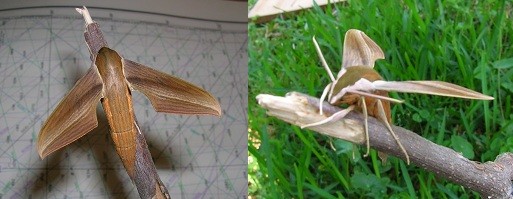 Tersa Sphinx Moth Copyright © Paige Graves |
A Mini Microscope with LED Light
I own this. It's very small, but perfect for looking at small things like butterfly eggs, coins etc.
 |
| SE Mini 45X Microscope w/ Illuminator SE Only $9.76 |
Where I found it: Columbia, South Carolina - at Mom's
What plant was it on? Sassafrass Tree
Did I raise it to moth/butterfly? No
Scientific name: Not sure
Looking through my new Caterpillars of Eastern North America Guide, this looks most like the Definite Tussock Moth, although the picture in the guide doesn't have the red spots along the back. Everything else is the same. If you happen to know about this caterpillar and/or moth please tell me in the guestbook. Thanks!
Want to Raise Some Butterflies? Speaking from Personal Experience -This is the Very Best School Study We've Ever Done
These kits have excellent ratings - My cousin used a kit like this and had only good things to say about it
 |  |
| Insect Lore Live Butterfly Garden Insect Lore Only $24.99 | Insect Lore Live Butterfly Pavillion Insect Lore Only $39.98 |
Where I found it: Columbia, South Carolina in my mom's yard.
What plant was it on: Hawthorn
Did I raise it to moth/butterfly? I didn't, but my mom did.
Very slight movement from the leaf of a Hawthorn tree caught my eye and this is what I found. This is the only Red-spotted Purple Butterfly caterpillar I've ever seen and it is a prize for me. One look at the butterfly and you'll see why some witty butterfly afficianados call it the Orange Spotted Blue instead. These caterpillars look almost identical to the Viceroy Butterfly caterpillar. Both look a little like bird poop and have "horns" which is thought to be camoflauge (my field guide does not call the horns antennae so I'm not sure if they are considered antennae or not). I know for sure the one I found was a RSP because my mom raised it and saw it change. A Viceroy is mainly bright orange.
Here's a photo of what it turns into:
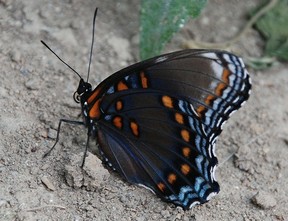
Photo used through CC by Jenny Pansing
Where I found it: St. Augustine, Florida
What plant was it on? some type of clover
Did I raise it to moth/butterfly? Not this one, but many others - yes
Scientific name: Hypercompe scribonia
I love how the caterpillar is holding onto the plant in this photo. We've raised many of these fuzzy black caterpillars. They turn into an amazing white moth with black circles or spots. I like them so much I wrote an entire article about them. Read more about the Great Leopard Moth here.
Here's a photo of what it turns into:
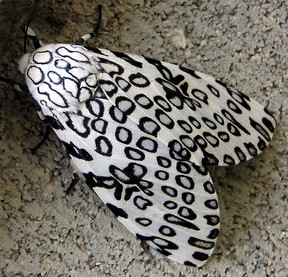
Photo used through CC by Normanack
My Favorite Cameras - The Nikon CoolPix - We've Owned Three of Them
The perfect point and shoot - in my opinion :-). Great quality at a great price. All of these caterpillar photos were taken with a CoolPix
 |  |  |
| Nikon COOLPIX L24 14 MP Digital Camer... Nikon Only $127.01 | Nikon COOLPIX S3100 14 MP Digital Cam... Nikon Only $139.91 | Nikon COOLPIX S3100 14 MP Digital Cam... Nikon Only $163.34 |
You might also like
Tiger Photography in Indian ReservesRead about photographing tigers in India. The page discusses behavioral chara...
Glimpses of a Farm that Once Was: A Photo CollectionMany farms have been turned over to ruin and are only skeletons of their form...
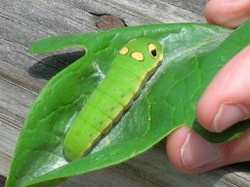

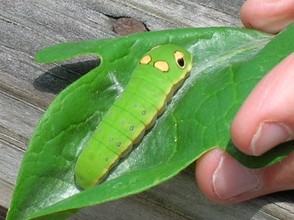
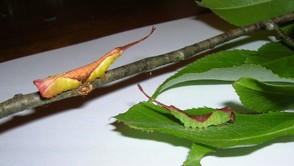
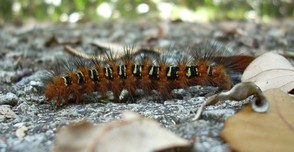
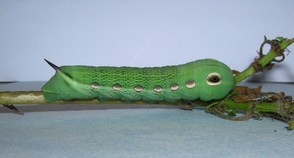
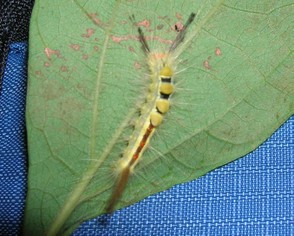
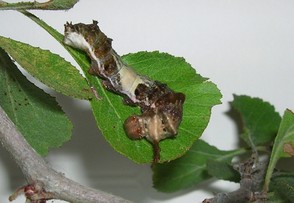
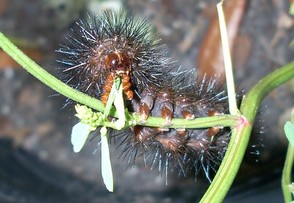

 What is Ebates?on 07/10/2011
What is Ebates?on 07/10/2011
 Honey Badger Don't Care Giftson 06/24/2011
Honey Badger Don't Care Giftson 06/24/2011
 How Much Does a Pint of Blueberries Weigh?on 06/08/2011
How Much Does a Pint of Blueberries Weigh?on 06/08/2011
 Top 5 Rhinestone iPod Touch Caseson 06/02/2011
Top 5 Rhinestone iPod Touch Caseson 06/02/2011

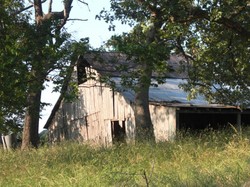
Have you raised any caterpillars or found any interesting looking caterpillars?
Thanks to your site, we identified a tersa sphinx moth caterpillar above the pentas on the lanai screen in Ft. Pierce, FL.
About 3 years ago we found a Hickory Horned Devil, about the size of a hotdog, and for a few days feed it. Then it burrowed into some potting soil that I placed in a container. We had hopes of seeing it emerge, but it never did.
Thank you! Your site helped to identify the Echo Moth caterpillar my son found in Punta Gorda, Florida. We are keeping it in hopes of being a part of its life changing cycle!
Thanks for the informative site. It helped us to identify a Spicebush Swallowtail Butterfly Caterpillar. Quite the mystery since we found it in Athabasca, Alberta - a great distance from it's normal locale.
I live in Ocala, FL and just today found a Tersa Sphinx Moth Caterpillar on my Penta plant. No one knew what it was until a friend found it & shared your site with me.
Yesterday, I noticed what I thought at first was a very long(3-4 foot)and skinny black snake in my yard. Upon further investigation, it was a massive "train" of slow moving black caterpillars all in a straight line, moving across the yard. I lost count at 75 caterpillars! Throughout the day, more and more slow moving lines came down from the oak tree into the yard. We also saw three more trains of them this morning. We have never seen anything like this! It was amazing. They are solid black, with hairy spines and have shiny black heads. It appeared that they stop from time to time, bunch up in a huge ball and get very still.....like maybe they are sleeping. One mass of caterpillars stayed bunched up and still for about 45 minutes, then they "woke up" and starting the slow procession again. We have lived in the woods for many years, but this was the first time we have seen this strange procession> Does anyone know what kind they may be? And what exactly are they doing? My first thought was they had just hatched and were heading to grass and bushes to eat before their next stage. I assumed they take on the look of a "Snake" to protect them from birds on their journey. But this is just speculation on my part. Any answers, I would appreciate. I am posting a picture I took.
I have a lot I mine a lot of giant leopard moth caterpillars in my yard their everywhere . red level Alabama
I just took a photo of a Tussock Moth caterpillar on my rose bush this morning. I'd never seen them in North Carolina before and I've lived here since 1977. Hope they don't stick around here.
The Tussock Moth Caterpillar looks like the caterpillars I use to see by the hundreds, if not thousands every year in the Corlears Hook Park, and other parks in NYC...when I was just a boy in the 1940s.
I've never seen them anywhere else.
Nice post. Different types of caterpillars, i had never seen it before bu got a chance now to watch and know about them.